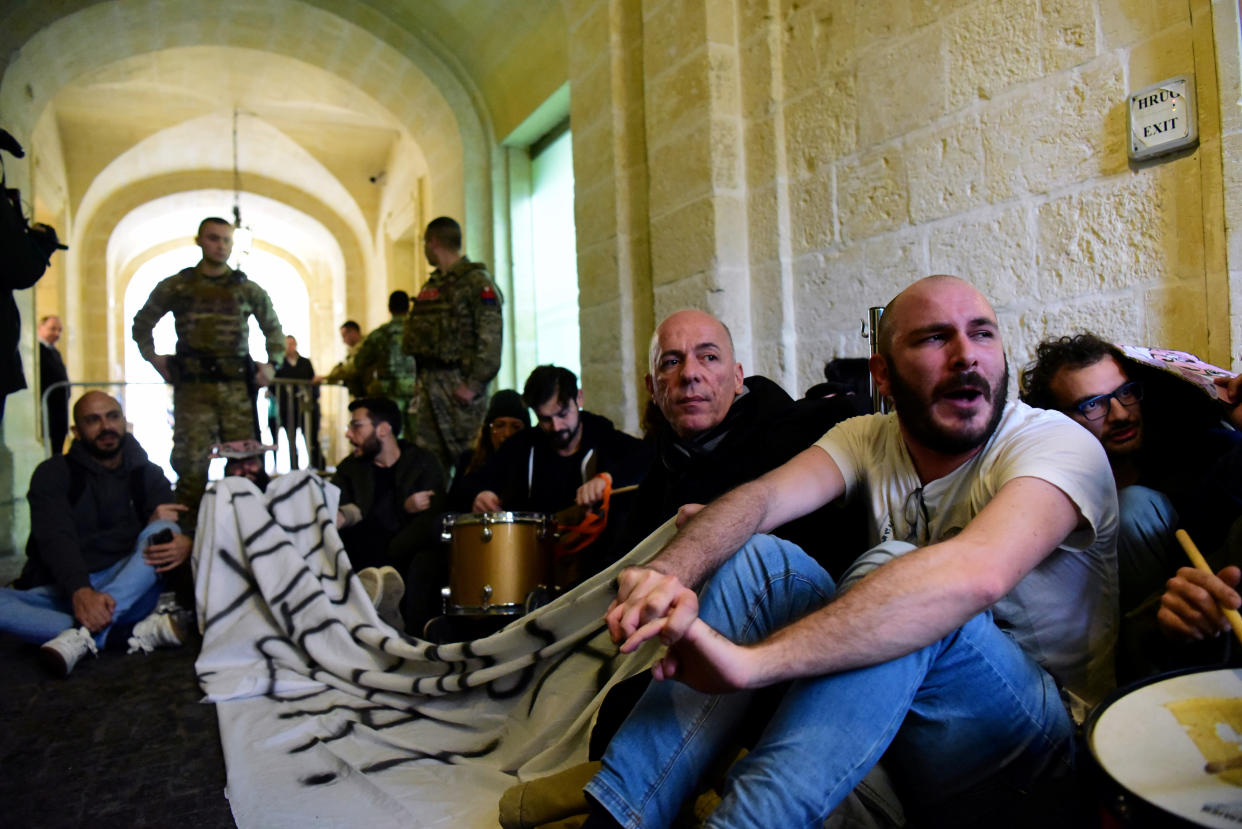One Free Press Coalition's '10 Most Urgent' list, January 2020

Yahoo News is a member of the One Free Press Coalition and is publishing the group’s latest “10 Most Urgent” list below to highlight the increasingly dangerous climate for journalism and free expression around the world in an effort to roll back repressive anti-press policies.
1. Daphne Caruana Galizia (Malta)
Malta acknowledges mishandling of journalist’s murder case.
Malta’s prime minister, Joseph Muscat, has announced he will resign on Jan. 12 in connection with the government’s mishandling of the investigation into Daphne Caruana Galizia’s death. The Panama Papers investigative reporter was killed in an October 2017 car bomb blast. Two years later, a public inquiry was initiated, and three senior members of Muscat’s administration stepped down over allegations of involvement in the murder, while three men are currently in detention in relation to the events.
2. Esraa Abdel Fattah (Egypt)
Egyptian journalist on hunger strike tortured and hospitalized.
Reports surfaced Dec. 16 that Esraa Abdel Fattah of banned website Tahrir News had been hospitalized in connection with her hunger strike. The reporter and social media coordinator had been detained two months at that point, charged with membership in a banned group, spreading false news and misusing social media platforms to disrupt national security. She began a hunger strike in October to demand an investigation into her allegations of mistreatment and torture.
3. Ilham Tohti (China)
Six years in jail for Chinese writer serving life sentence.
This month, Uighur scholar, writer and blogger Ilham Tohti is serving his sixth year of a life sentence. Uighurbiz, the Chinese- and Uighur-language website he founded in 2006 with a focus on social issues, was shuttered for its “separatist” ideas (a charge Tohti denied) after his arrest in 2014. China is the leading jailer of journalists and allows Tohti’s wife and family members to visit him for only 30 minutes every three months.
4. Agnès Ndirubusa and the team at Iwacu (Burundi)
Four Burundi reporters imprisoned and awaiting trial.
Four journalists were arrested in Burundi in October while covering clashes in the country’s Bubanza Province. Senior political reporter Agnès Ndirubusa, broadcast reporter Christine Kamikazi, English-language reporter Egide Harerimana and photojournalist Térence Mpozenzi face up to 10 years in prison if convicted of the charges of undermining state security.
5. Aleksandr Valov (Russia)
Imprisoned Russian journalist’s whereabouts unknown.
Aleksandr Valov’s lawyer has not been able to contact or locate him. The editor in chief and founder of local news site BlogSochi was arrested Jan. 19, 2018, and is currently serving a six-year sentence on trumped-up extortion charges. Valov narrated a live-stream video showing police beating him during the arrest.
6. Jesús Medina (Venezuela)
Trial of detained Venezuelan photographer repeatedly delayed.
The trial of freelance photographer Jesús Medina has repeatedly been postponed, with the date currently set for Jan. 30. The only Venezuelan journalist imprisoned, according to CPJ’s 2019 prison census, has been held in pretrial detention at Ramo Verde military prison since August 2018. He is accused of criminal association and inciting hate.
7. Jamal Khashoggi (Saudi Arabia)
Demands for answers in Khashoggi murder persist into new decade.
The new decade arrives without an independent criminal investigation into the 2018 high-profile, brazen killing of Washington Post columnist Jamal Khashoggi inside Istanbul’s Saudi Consulate. Calls have gone unheeded for the U.S. and U.N. to probe the Saudi crown prince’s role in the “extrajudicial killing,” as have calls for the White House to release intelligence reports. Meanwhile, the kingdom ended 2019 holding 26 journalists in prison.
8. Masoud Kazemi (Iran)
Corruption reporter serving time while government bans internet.
While Iran implemented an Internet ban in November in response to protests over rising gas prices, Masoud Kazemi sat in prison on charges stemming from 2018 Twitter posts about government corruption. Editor in chief of the monthly Sedaye Parsi political magazine, Kazemi was sentenced in June to four-plus years, found guilty of spreading misinformation and insulting the supreme leader and other Iranian officials. For an additional two years, he will be banned from working as a journalist.
9. Qazi Shibli (India)
Communications blackout slows case of jailed editor in weakening health.
Arrests in Kashmir constitute India’s only two cases of jailed journalists, according to CPJ tracking. And the region’s ongoing communications shutdown that started Aug. 5 — the longest ever imposed in a democracy — has slowed trial hearings and updates to family members. Kin of Kashmiriyat news website editor Qazi Shibli didn’t know his whereabouts for more than a month after his July arrest for allegedly reporting on Twitter about troop movements. The family has since expressed serious concerns about his health and hired a lawyer’s help to petition for bail.
10. Nariman Memedeminov (Russia)
In October, a military court in Russia’s southern city of Rostov-on-Don sentenced Nariman Memedeminov to two years and six months in prison, convicted of making public calls for terrorism online. That followed the 2018 raid of the freelance journalist’s home and his arrest. His coverage included live-streamed trials of Muslim minority Crimean Tatar activists and interviews with their family members and lawyers since Russia annexed Crimea in 2014.


